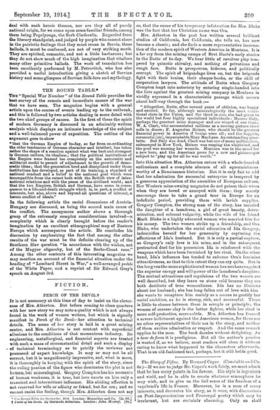THE ROUND TABLE.*
THE " Special War Number" of the Bound Table provides the best survey of the remote and immediate causes of the war that we have seen. The magazine begins with a general article upon the course of events leading up to the outbreak, and this is followed by two articles dealing in more detail with the two chief groups of causes. In the first of these the spirit of modern Germany is discussed in an admirably written analysis which displays an intimate knowledge of the subject
and a well-balanced power of exposition. The outline of the argument goes to show
" that the German Empire of to-day, so far from co-ordinating the older tendencies of German character and intellect, has taken rather the shape of a reaction against what was best and strongest m German culture, its idealism ; that the political institutions of the Empire were framed too completely on the autocratic and militarist model to permit of adjustment to the growth of demo- antic ideas ; that the generation bred and disciplined under those institutions has developed, as part of its training, a standard of national conduct and a belief in the national goal which were incompatible from the outset both with the British view of inter- national relations and with the peace of the civilized world; and that the two Empires, British and German, have come in conse- quence to a life-and-death struggle which is, in part, a conflict of interests, but also, above and beyond all questions of interest, a heroic conflict of ideals."
In the following article the racial dissensions of Austria- Hungary are discussed, as being the second main cause of the conflict. The anonymous author shows a thorough grasp of the extremely complex considerations involved—a complexity which is clearly brought before the reader's imagination by an excellent ethnographical map of Eastern Europe which accompanies the article. He concludes his
discussion by emphasizing the fact that among the other results of the war must be the definite clearing up of the Southern Slav question "in accordance with the wishes, not of the Magyar oligarchy, but of the Serbo-Croat race." Among the other contents of this interesting magazine we may mention an account of the financial situation under the beading of "Lombard Street in War," a well-arranged précis of the White Paper, and a reprint of Sir Edward Grey's speech on August 3rd.


































 Previous page
Previous page